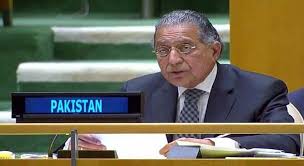Pakistan has strongly warned the international community about the TTP threat, saying the outlawed group is becoming a central hub for regional terrorist outfits. Speaking at the United Nations Security Council briefing on Afghanistan, Pakistan’s Permanent Representative, Munir Akram, raised serious concerns.
He said that the Tehreek-e-Taliban Pakistan aims to harm the security and stability of Afghanistan’s neighbors. Pakistan believes that the group is receiving support from Afghanistan’s interim government. This TTP threat, according to Akram, has grown into a larger risk for the entire region.
In previous sessions, Pakistan had already informed the global community about the presence of more than 20 terrorist networks in Afghanistan. These groups pose a danger not only to Afghanistan but also to the broader region and even the world.
Pakistan blamed the Afghan authorities for failing to act against terrorist groups like Al-Qaeda, the TTP, the Baloch Liberation Army (BLA), and the Majeed Brigade. Akram warned that the TTP threat extends beyond the region, as the group has old links with Al-Qaeda. This link could lead to a global security crisis, he said.
He revealed that the banned group has around 6,000 fighters and is the largest declared terrorist outfit based in Afghanistan. These militants use safe zones near the Pakistan-Afghanistan border to launch deadly attacks. They have carried out multiple cross-border strikes, killing civilians, soldiers, and damaging national institutions.
Akram accused Kabul authorities of not just tolerating but also being involved in the TTP’s cross-border terrorism. He claimed there is evidence of their complicity in these acts.
He also highlighted how the TTP threat is linked with other extremist groups like the BLA and the Majeed Brigade. These groups aim to destabilize Pakistan and sabotage projects under the China-Pakistan Economic Corridor (CPEC).
Pakistan’s ambassador alleged that the group also receives foreign funding from Pakistan’s main rival. This external support adds to the rising TTP threat in the region.
Akram said that Pakistan will continue taking firm action to eliminate all forms of terrorism. He stressed Pakistan’s right to self-defense under international law and the UN Security Council’s resolutions.
He told the Security Council that Pakistan’s border forces have seized modern arms and ammunition. These weapons were once in the possession of foreign troops and later fell into the hands of Afghan authorities. Some of these weapons were used in cross-border attacks.
On the economic front, Akram called for unfreezing Afghanistan’s central bank assets. He said this move would help the country stabilize its banking system and reduce illegal financial flows. He also urged Afghanistan to control terrorism and stop illegal trade, which would improve economic ties between both nations.
Ambassador Akram also spoke about key regional projects like the TAPI gas pipeline, CASA-1000 power project, and the Uzbekistan-Afghanistan-Pakistan Railway line. He said Pakistan is fully committed to regional development, economic connectivity, and peace.


